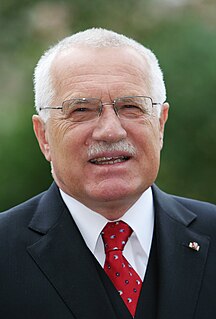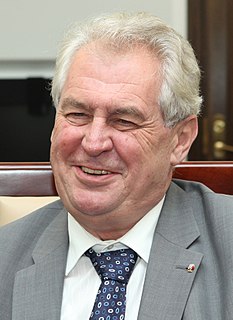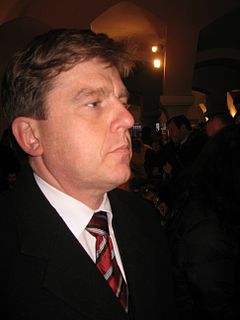
The President of the Czech Republic is the elected formal head of state of the Czech Republic and the commander-in-chief of the Military of the Czech Republic. Unlike counterparts in other Central European countries such as Austria and Hungary, who are generally considered figureheads, the Czech president has a considerable role in political affairs. Because many powers can only be exercised with the signatures of both the President and the Prime Minister of the Czech Republic, responsibility over some political issues is effectively shared between the two offices.

Dagmar Havlová is a Czech actress. She married Václav Havel, then Czech President, on 4 January 1997. She has one daughter, Nina Veškrnová, from a previous marriage to Radvít Novák (1975–1980).

The 2003 Czech presidential election took place in January and February 2003 to elect a new President of the Czech Republic. The Parliament of the Czech Republic failed to elect a candidate on the first 2 ballots on the 15 and 24 January. However, on the third round of the third ballot on the 28 February, Václav Klaus was elected President.

The first direct presidential election in the Czech Republic was held on 11–12 January 2013. No candidate received a majority of the votes in the first round, so a second round runoff election was held on 25–26 January. Nine individuals secured enough popular signatures or support of parliamentarians to become official candidates for the office. Miloš Zeman (SPOZ) and Karel Schwarzenberg qualified for the second round of the election.

The 1993 Czech presidential election was held on 26 January 1993 to elect the first President of independent Czech Republic. The first election was done indirectly by the members of the Czech Republic Parliament. Václav Havel was elected President. The election was complicated only by attacks of Republicans against Havel and by bomb threat to the Parliament.

Marie Stiborová is a Czech university lecturer, politician, former member of Czech National Council and Chamber of Deputies of the Czech Republic. She was also Communist presidential candidate in Czech presidential election, 1993. She later became the leader of reformist wing within KSČM and established Left Bloc party,
Stanislav Fischer is Czech Astrophysicist and politician. He was Communist candidate for president in 1998.
The 1989 Czechoslovak presidential election was held on 29 December. Václav Havel became the first non-communist president of Czechoslovakia since 1948. Election was held following the Velvet Revolution.

Lubomír Zaorálek was elected Speaker of the Chamber of Deputies of the Parliament of the Czech Republic on 11 July 2002..

Election of the Speaker of the Chamber of Deputies of the Parliament of the Czech Republic was held in June, July and August 2006. Chamber of Deputies was unable to elect new Speaker for 2 months. Miloslav Vlček was eventually elected the new Speaker. Vlček was considered a provisory Speaker but remained in the position shole term.
The 1920 Czechoslovak presidential election took place on 27 May 1920. It was the first contested presidential election. Tomáš Garrigue Masaryk has won his second term against German medician August Naegle.
The 1927 Czechoslovak presidential election took place on 27 May 1927. Tomáš Garrigue Masaryk was elected for his third term. His main rival was Communist Václav Šturc.
The 1934 Czechoslovak presidential election took place on 24 May 1934. Tomáš Garrigue Masaryk was elected for his fourth term.
The 1935 Czechoslovak presidential election took place on 18 December 1935. Edvard Beneš was elected the second President of Czechoslovakia and replaced Tomáš Garrigue Masaryk. Beneš's victory was considered unlikely due to lack of support in a parliament but negotiations helped him to win much larger support than Masaryk has ever received.
The 1938 Czechoslovak presidential election took place on 30 November 1938. The election was held following Munich Agreement. Edvard Beneš resigned on his position and Emil Hácha became the new president.
The 1946 Czechoslovak presidential election took place on 19 June 1946. It was first election since end of World War II. Edvard Beneš was elected for his second term.

The 1948 Czechoslovak presidential election took place on 14 June 1953. It was held due to the death of Klement Gottwald. Antonín Zápotocký was elected the new president.
The 1964 Czechoslovak presidential election took place on 12 November 1964. Antonín Novotný was elected for his second term. It was the first time that the president was elected for a five-year term.
The 1990 Czechoslovak presidential election was held on 5 July 1990. Václav Havel was elected for his second term. Havel was the only candidate. Slovak National Party intended to nominate Štefan Kvietik who declined to run.












